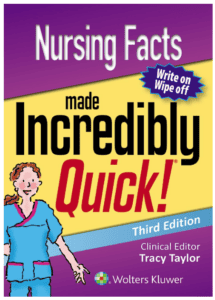10 Study Tips for Nursing Students: Proven Tips for Success
Looking for the best study tips for nursing students? It can be challenging, trying to balance coursework, clinicals, and personal life. This doesn’t leave much time for studying which is crucial for success in a nursing program. If you’re a nursing student struggling to study effectively, you’re not alone many nursing students have the same problem. Fortunately, there are a few nursing school tips that you can use to help you retain information, understand complex concepts, and prepare for nursing exams.

In this blog post, we’ll be sharing ten proven study tips to help you enhance your learning process. Whether you are taking an anatomy class, learning pharmacology, or studying for the NCLEX exam, these tips have helped me and many other nursing students be successful in their programs. So, let’s dive in!
What are the best study tips for nursing students?
As a student, it’s important to find nursing school study tips that are tailored to your individual needs. Every student has a different learning style and preferences, so choose the study tips that work for you.
Here are some of the most effective strategies to choose from:
1. Use study guides

Study guides are a great way to organize and review course material. They summarize the key points, terms, and concepts that you need to know for exams. By using a study guide, you can stay focused on what’s essential and avoid getting lost in the details. For example, you can create a nursing exam study guide for each chapter or topic and review it regularly. This will help you stay on track and retain information better.
2. Study a little every day

The brain learns better when information is broken down into smaller chunks and reviewed frequently (source). Studying a little bit every day is more effective than cramming for hours before an exam. It enables your brain to process the information and retain it better over time.
You can set aside a specific time of the day to study or break it up into smaller intervals throughout the day. Writing out a schedule or planner can help you plan out your study time and ensure that you have enough time for reviewing and practice tests.
3. Form or participate in a study group
Studying with peers can be a great way to learn and retain information better. It allows you to share notes, ask questions, and discuss difficult concepts. By working together, you can fill in knowledge gaps and clarify misunderstandings. Besides, study groups can motivate you to study consistently and stay on top of the coursework.
You can schedule a study group once a week with four or five of your peers. Assign different topics for each member to research and present to the rest of the group. This method also helps you break down complex topics into smaller sections or chunking.
4. Utilize downtime as study time

As a nursing student, there are moments of downtime between classes, during breaks, or while commuting. Instead of scrolling through social media or watching videos, use this time to review class notes or read course materials. This way, you can make the most out of your time and stay ahead of the coursework.
For instance, you can listen to educational podcasts during your commute, or use flashcards to help you memorize key terms during your breaks. These small increments of focused study throughout the day can significantly improve your knowledge retention.
5. Understand one’s learning style

Everyone has a different learning style and it’s essential to identify your style to optimize your study routine. Some students are visual learners, while others are auditory learners or may prefer hands-on and interactive learning. You can take a learning style quiz to identify your style and incorporate study techniques that align with it. For example, if you’re a visual learner, you can use diagrams, charts, and videos to supplement your study material.
6. Complete practice questions
Practice questions are a great way to test your knowledge and identify areas that need improvement. By practicing questions similar to those on the nursing exam, you can improve your test-taking skills and reduce test anxiety. Many textbooks and online resources provide practice questions and exams.
Practice question books like “NCLEX-RN Review Made Incredibly Easy,” or online resources like “Kaplan Test Prep,” are great options to help you prepare for test taking. You can also create your practice test or take advantage of the resources provided by your school.
7. Review information after class

It’s easy to forget what you learned in class if you don’t review and reinforce the material afterward. After your class, take a break for 15-20 minutes to review your notes. Write a summary of the most important topics and try to explain them in your own words.
Reviewing your notes can help you retain information better and clarify any missed concepts. It’s best to review your notes within 24 hours after the class to keep the information fresh in your memory (source).
8. Reward yourself

Studying can be stressful, and it’s important to reward yourself after a productive study session or a completed task. Rewards can help you stay motivated, reduce stress, and boost self-esteem. Rewards can be anything that you enjoy, such as a favorite snack, watching an episode of your favorite show, or taking a walk outside. Remember to set realistic goals and reward yourself in moderation.
9. Create concept maps
Concept maps are visual tools that help to organize and connect ideas. They can help you organize your thoughts and see how big concepts link together. They’re particularly effective for subjects that require memorization, such as anatomy and physiology. By breaking down complex concepts into smaller parts and connecting them visually, you can enhance your understanding and retention of the material.
For example, if you’re studying the heart and blood flow, create a concept map that shows the chambers of the heart, associated valves, and the path of blood flow through the heart. This method can help you form a clear understanding of each concept and help you explain the information in a more coherent way.
10. Utilize all available resources

As a nursing student, you have access to a wide range of resources that can aid in your learning process. These may include textbooks, online resources, learning aids such as flashcards and apps, tutoring services, and academic advisors. Resources like the “Nursing Facts Made Incredibly Quick!” book, The Merck Manual, and UpToDate can provide you with valuable resources that cover various nursing education topics.
In addition, attend your professors’ office hours and use their feedback to improve your knowledge. Use online resources like podcasts, e-books, and websites such as RegisteredNursing.org and NursesLabs.com to supplement your classroom education and expand your knowledge base. It’s best to take advantage of as many resources as possible to stay on top of the coursework and adequately prepare for exams.
How many hours should a nursing student study?
The amount of time a nursing student should dedicate to studying may vary depending on the individual and their course load. Generally, it is recommended to study for at least 2-4 hours a day. The number of hours may need to be adjusted for bigger tests and projects, as well as when clinicals begin.
Some students opt to study for longer periods such as 4-6 hours a day, while others prefer to stick to 1-2 hour sessions. It’s important to find the study schedule and study environment that works best for you in order to maximize your time and effort.
What do nursing students struggle with the most?
Nursing school is a demanding program that requires students to balance extensive coursework, clinical rotations, and personal life. Time management can be a major struggle especially in an accelerated nursing program due to the intensity of the program and its requirements. Academic demands such as lectures, homework and projects, and exams can be grueling for a nursing student.
Transitioning to hands-on clinical programs can present new challenges and increase your workload as well. Due to the demanding nature of nursing school, students may find it difficult to maintain a healthy work-life balance because there is little time left for other activities. So it’s important to take advantage of all available resources to manage your physical and mental health as well as your time effectively in order to succeed in nursing school.
Is nursing school hard if you study?
Nursing school is challenging, but it’s not impossible to succeed if you are willing to put in the effort and time required. Take the time to study, prepare, and use your resources wisely. Stay committed and disciplined in order to maintain a healthy work-life balance and nursing career.
Remember that everyone’s journey through nursing school is different seek help when you need it and don’t be afraid to ask for support from professors or classmates. With the right motivation and dedication, you can succeed in nursing school.
What is a good GPA for a nursing student?
The GPA requirements for nursing students can vary depending on the nursing program and school. For students with standardized test scores such as an SAT or ACT score, most schools require a 3.0 GPA on a 4.0 scale. If you are applying without standardized test scores, a 3.4 GPA on a 4.0 scale is usually the requirement.
Generally, a minimum GPA of 2.0 is required to remain in the program, which is equivalent to a C grade point average. However, if you have aspirations to pursue a bachelor’s degree or graduate studies in the future, a higher GPA such as 3.0 or higher may be necessary for acceptance into some programs.
What is the Pomodoro technique?
The Pomodoro technique is a simple, yet effective time management method developed by Francesco Cirillo in the late 1980s. It uses a kitchen timer to break work into intervals, usually 25 minutes each. Each interval is known as a “pomodoro”, Italian for “tomato”, after the tomato-shaped kitchen timer Cirillo used. The idea behind the technique is to help you focus better by giving you breaks from your work and limiting the amount of time you spend on tasks.
The Pomodoro technique has six steps:
1. Decide on the task you want to do.
2. Set your timer (usually 25 minutes).
3. Work on the task until the timer rings and take a short break (5-10 minutes).
4. After four work intervals, take a longer break of 15-30 minutes.
5. Repeat the process!
This technique is all about consistency rather than perfection and it’s a great way to stay focused, maximize efficiency, and balance your work-life. Try using an app that works on desktop or mobile to make the technique easy to follow!
Wrapping up
As a student, nursing school success depends a lot on effective studying habits. Utilize the ten study tips outlined above to enhance your learning process, increase knowledge retention, and improve test-taking skills. Identifying your unique learning style will also help to maximize your productivity and the effectiveness of these techniques. With regular practice, you can stay ahead of your coursework, reduce stress, and achieve your goals in nursing practice. So don’t wait, start studying smarter today!







